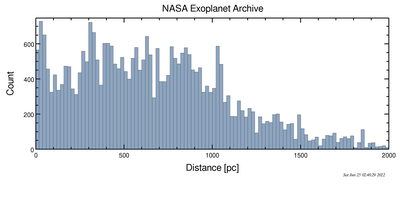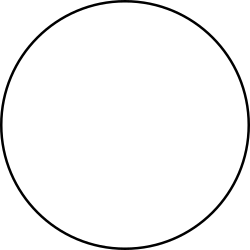astro.wikisort.org - Planet
These are lists of exoplanets. As of 1 November 2022, there are 5,246 confirmed exoplanets in 3,875 planetary systems, with 842 systems having more than one planet.[1] Most of these were discovered by the Kepler space telescope. There are an additional 2,054 potential exoplanets from Kepler's first mission yet to be confirmed, as well as 978 from its "Second Light" mission and 4,053 from the Transiting Exoplanet Survey Satellite (TESS) mission.[2]

For yearly lists on physical, orbital and other properties, as well as on discovery circumstances and other aspects, see § Specific exoplanet lists.
Nomenclature
The convention for designating exoplanets is an extension of the system used for designating multiple-star systems as adopted by the International Astronomical Union (IAU). For exoplanets orbiting a single star, the IAU designation is formed by taking the designated or proper name of its parent star, and adding a lower case letter.[3] Letters are given in order of each planet's discovery around the parent star, so that the first planet discovered in a system is designated "b" (the parent star is considered to be "a") and later planets are given subsequent letters. If several planets in the same system are discovered at the same time, the closest one to the star gets the next letter, followed by the other planets in order of orbital size. A provisional IAU-sanctioned standard exists to accommodate the designation of circumbinary planets. A limited number of exoplanets have IAU-sanctioned proper names. Other naming systems exist.
Methods of detection
- Transit: 3,928 (75.0%)
- Radial velocity: 1,018 (19.4%)
- Microlensing: 168 (3.2%)
- Direct imaging: 61 (1.2%)
- Transit-timing variation: 23 (0.4%)
- Eclipse timing variation: 18 (0.3%)
- Orbital brightness modulation: 9 (0.2%)
- Pulsar timing variation: 8 (0.2%)
- Pulsation timing variation: 2 (0.0%)
- Astrometry: 2 (0.0%)
- Disk kinematics: 1 (0.0%)
Specific exoplanet lists

- List of directly imaged exoplanets
- List of exoplanets discovered before 2000 (32)
- List of exoplanets discovered between 2000–2009 (379)
- List of exoplanets discovered in 2010 (109)
- List of exoplanets discovered in 2011 (179)
- List of exoplanets discovered in 2012 (148)
- List of exoplanets discovered in 2013 (151)
- List of exoplanets discovered in 2014 (878)
- List of exoplanets discovered in 2015 (151)
- List of exoplanets discovered in 2016 (1513)
- List of exoplanets discovered in 2017 (152)
- List of exoplanets discovered in 2018 (297)
- List of exoplanets discovered in 2019 (188)
- List of exoplanets discovered in 2020 (264)
- List of exoplanets discovered in 2021 (243)
- List of exoplanets discovered in 2022 (303)
- List of exoplanet extremes
- List of exoplanet firsts
- List of exoplanets discovered using the Kepler space telescope
- List of exoplanets observed during Kepler's K2 mission
- List of extrasolar candidates for liquid water
- List of multiplanetary systems
- List of nearest exoplanets
- List of nearest terrestrial exoplanet candidates
- List of potentially habitable exoplanets
- List of proper names of exoplanets
- List of transiting exoplanets
See also
- Lists of astronomical objects
References
- Schneider, J. "Interactive Extra-solar Planets Catalog". The Extrasolar Planets Encyclopedia. Retrieved 1 November 2022.
- "Exoplanet and Candidate Statistics". NASA Exoplanet Archive. NASA Exoplanet Science Institute. Retrieved 13 September 2019.
- "International Astronomical Union | IAU". www.iau.org. Retrieved 29 January 2017.
External links
- The NASA Exoplanet Archive
- The Extrasolar Planet Encyclopaedia — Catalog Listing accessed in 2015-09-28
- Exoplanet Data Explorer accessed in 2015-09-28
- "Open Exoplanets Catalogue". Retrieved 2017-02-27.
- Wright, J. T.; Fakhouri, O.; Marcy, G. W.; Han, E.; Feng, Y.; Johnson, John Asher; Howard, A. W.; Fischer, D. A.; Valenti, J. A. (2011-04-01). "The Exoplanet Orbit Database". Publications of the Astronomical Society of the Pacific. 123 (902): 412–422. arXiv:1012.5676. Bibcode:2011PASP..123..412W. doi:10.1086/659427. ISSN 0004-6280. S2CID 51769219.
На других языках
[de] Liste extrasolarer Planeten
In der folgenden Liste (Liste der Exoplaneten) sind alle extrasolaren Planeten aufgeführt, die durch voneinander unabhängige Beobachtungen erfasst worden sind. Zählt man die unbestätigten Objekte hinzu, wie sie in der EPE genannt werden, so sind mit dem Stand vom 31. Januar 2021 in 3256 extrasolaren Planetensystemen 4408 Exoplaneten bekannt, wobei 721 Systeme mit mehreren Planeten beobachtet wurden.[1] Zudem sind, den Angaben der NASA zufolge, in 3216 Systemen 4341 bestätigte Planeten bekannt, von denen über 230 den Erdähnlichen zugeordnet wurden.[2]- [en] Lists of exoplanets
Другой контент может иметь иную лицензию. Перед использованием материалов сайта WikiSort.org внимательно изучите правила лицензирования конкретных элементов наполнения сайта.
WikiSort.org - проект по пересортировке и дополнению контента Википедии



